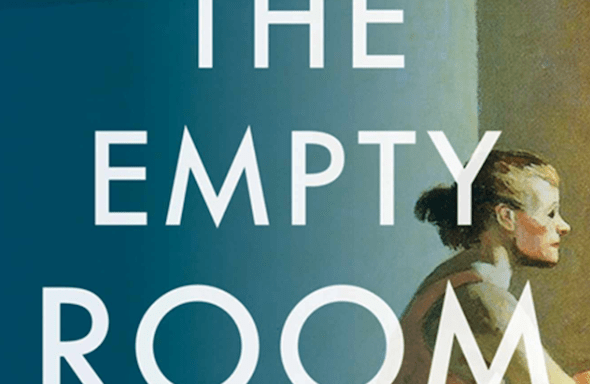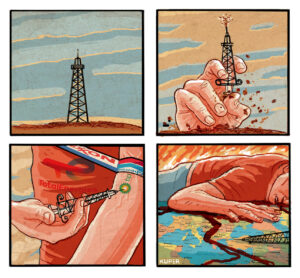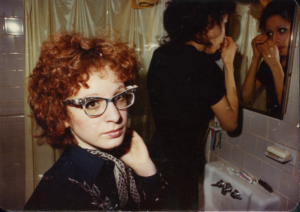|
To see long excerpts from “The Empty Room” at Google Books, click here.
|
“The Empty Room”
A book by Lauren B. Davis
“For R.E.D. — if it weren’t for you, this wouldn’t be fiction.” These sober words preface Lauren B. Davis’ devastating stream of consciousness novel, “The Empty Room.” It is the story of Colleen Kerrigan, an isolated, middle-aged woman with a serious drinking problem. Waking up Monday morning from a blackout bender, Colleen gazes at a postcard of Dylan Thomas’ writing shed at Laugharne. “The tiny room, the whitewashed walls, the simple desk and chair, the photos on the walls, the crumpled bits of paper, the bottle, the astonishing work Thomas created there. … This was Colleen’s idea of perfection.” Even in Colleen’s perfect idyll, the bottle claims its place. “They don’t call it spirits for nothing” is her nervous refrain. Where Davis’ writing blazes is in her ability to dissect the patterns of fear, denial, lies and justification that propel an alcoholic further into an addiction that destroys everything she has and is.
By telling the story from Colleen’s point of view, Davis is able to blindside the reader the way Colleen’s binging and blackouts blindside her. When she first drinks, Colleen is sensual and relaxed — she delights in the fire coursing through her veins. But the highs ebb, and the accelerating dance of bad choices and worse behavior achieves an almost unbearable sense of dread.
Like James Joyce’s “Ulysses,” “The Empty Room” tracks an entire life that plays out in one day. Far worse than watching hung-over Colleen negotiate the Toronto subway and arrive late for work at the university, is to see her panic at a professor’s simple request for a stack of photocopies she was to have made. Davis makes you feel the sweat dripping from Colleen’s pores. Called on the carpet and confronted with her drinking, she is given a chance to go to rehab and keep her position. Colleen savagely bats back any intervention. Drink is a relationship so primal, she’d rather lose her job.
Davis’ narrative also intrigues structurally. As Colleen muddles through her day, random details trigger shameful memories that play like reruns in her head. We see Colleen as a child, stranded between an absent but loving alcoholic father and a bitter, mentally ill mother. As in her critically acclaimed novel, “Our Daily Bread,” Davis excels once again at quietly observing the cruelty children must survive at the hands of abusive parents. These flashbacks are inflected with a child’s point of view, so Colleen relives these horrors without gaining insight into the deep grooves they’ve etched. The reader, however, flinches as the patterns of cruelty amass.
Davis brings fierce honesty and compassion to Colleen’s odyssey. She doesn’t shy away from the ugliness and humiliation of alcoholism. Colleen foolishly opts to take placement tests at a temp agency while under the influence. She even buries a vodka-filled salad dressing bottle in her bag and sneaks it in with her — “just in case she got nervous.” Too befuddled to contend with the questions, Colleen interrupts an IQ test to steal a nip in the ladies room:
She found the friendly bottle, unwrapped it from its plastic overcoat, opened it and tilted it to her lips. Just a little and she’d relax. … It didn’t take much, just a small unthinking adjustment, and the salad dressing bottle slipped. She felt it go and snatched at it, but was too slow. She watched it fall to the floor and as it fell she thought, maybe it won’t break. Maybe it will just fall and I’ll be able to nab it and stuff it back in my bag with no one the wiser. Maybe it will be all right.
The corner of the bottle hit the unforgiving tile and didn’t merely break, it exploded. Pink vodka flew everywhere. The woman in the other stall yipped, and for a moment Colleen feared a piece of glass might have struck her.
Then the room went still. Fumes rose to Colleen’s nostrils, acrid and unmistakably alcoholic.
“Is everything okay?” a woman’s voice said.
“Fine, thanks,” said Colleen. The woman, whoever she was, didn’t respond, and Colleen felt obliged to explain. “I dropped a bottle of salad dressing.”
A moment’s silence, and then “Bummer,” followed by a flush.
Davis employs black humor to create cognitive dissonance. Colleen remembers getting sick-drunk for the first time at age 14, and sees herself sprawled on the bathroom floor, her mother towering over her, about to slap her in the face: “This won’t hurt at all, she thought, and sure enough, it didn’t, and under the force of the blow her head turned in slow motion so that she could watch the toilet tank approaching her forehead, although she didn’t remember a thing after that.”Davis is fascinated by alcohol’s capacity to distort perception. One of her most potent metaphors derives from Hans Christian Andersen’s fairy tale “The Snow Queen.” Colleen recalls the story as a childhood fable about the power of treacherous mirrors: “A wicked sprite fashioned a mirror with the power to make everything good and beautiful look ugly and mean, and all that was ugly and horrible look even more atrocious. The mirror was smashed into a hundred million and more pieces, some no larger than a grain of sand, and these flew about in the world, and when they got into people’s eyes, there they stayed, and then people saw everything perverted, or only liked looking at that which was evil. Splinters even found their way into the hearts of some people and that was the worst of all, for their hearts became like lumps of ice.”
Images of explosion, shattering and smashing proliferate. Colleen pours herself a glass of vodka: “It hit her belly like a grenade, sending shrapnel straight to her brain.” Colleen’s mother, Deirdre, wields a butcher knife, firing onion shards into the air, in the same way her husband and daughter flee the house. Only once does Colleen sense beauty and sanctuary — as a young woman alone on Christmas Day after her parents refuse to buy her a ticket home (“You’ve made your own mess, young lady, you’ll have to clean it up”), staring out a window in a scene that is a kind of emotional and spiritual touchstone:
“Round about four o’clock, when the sun was setting and the snow on the streets turned blue, she moved her chair from beside the unlit little fireplace, and sat at the bay window watching the Christmas world go by. … Then, as though everyone who had somewhere to go had arrived at their destination and not a creature was stirring, the world seemed to settle, to take a deep breath and sigh it out again. … For a moment it felt as though she were outside her body, watching a girl in a white bathrobe sitting on a spring-sprung old chair by a frosted window. Then suddenly she was back inside her skin, but in that moment peace had washed over her. She felt as though she needed no one and nothing. … She felt … well, companioned was the only word she could think of. She felt known by something greater than herself, some entity who knew her, all of her, and still loved her, not in spite of what they knew, but because of it. She felt clean, and utterly calm.”
Colleen’s fraying relationships with her failing mother, her estranged ex-lover, Jake, her agoraphobic elderly friend, Helen, and the surprising Pat Minot, are rendered with rich authenticity. But the revelation in Davis’ novel is her portrayal of Colleen’s tortured relationship with herself. Colleen burns every single possible bridge. With nothing left to burn, she shores herself up in her empty room.
“Emptiness wasn’t empty at all; it was a thick block of solid no-sound, no-presence. An empty room was filled with all the things that weren’t in it,” the author writes.
Davis knows the courage it takes to face that emptiness. She herself emerged, through grace and the help of an unnamed other, from alcoholism and addiction. Her unforgettable anti-heroine, Colleen Kerrigan, avoids that confrontation with emptiness up until the brink of death. But once Colleen accepts the reality of her life, she finally finds herself free to fill that emptiness “with anything at all.”








You need to be a supporter to comment.
There are currently no responses to this article.
Be the first to respond.